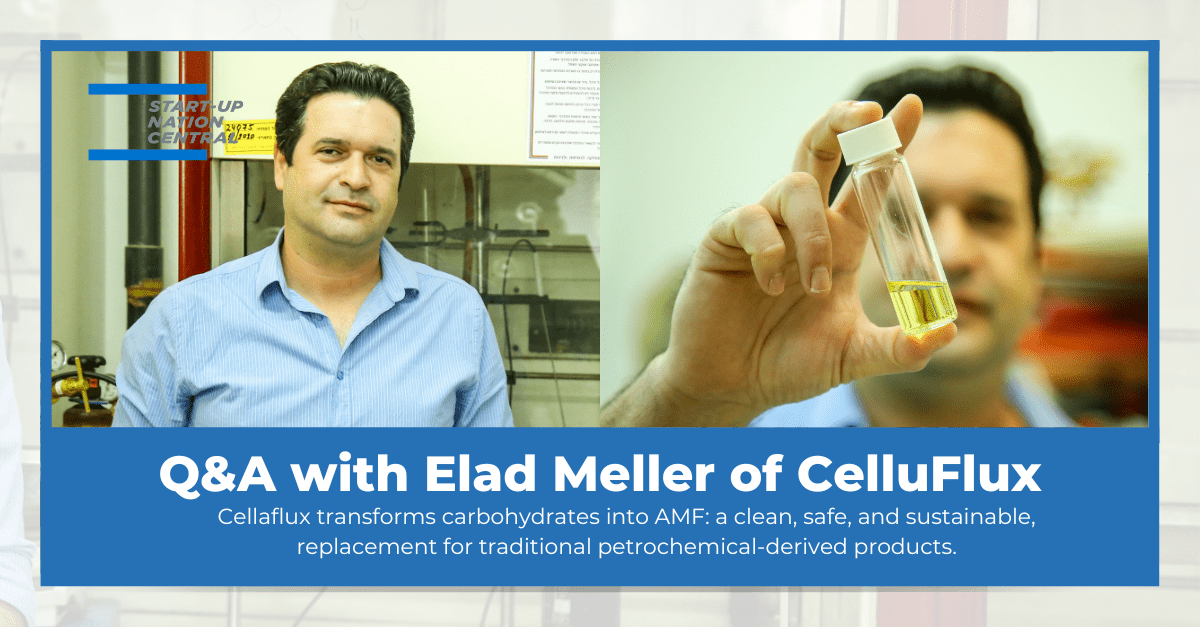
“I believe carbohydrates will be the main source of carbon in the future in the same manner that petroleum is the main source of carbon today.”
The effects of climate change are happening before our eyes. With harsh weather conditions breaking out worldwide and one of the hottest summers ever recorded coming to an end, tech companies are moving quickly to try and make an impact. Celluflux is looking to change a low-level issue in the chemistry domain regarding the production and utilization of petrochemicals.
Leading the charge to develop groundbreaking compounds is Elad Meller, Co-founder & CEO of Celluflux. Equipped with a Ph.D. in chemistry and BA in business administration from The Hebrew University of Jerusalem, he’s devoted many years of his life towards innovation via chemistry. As a long-time chemist, Elad is focused now on finding efficient manufacturing technologies of bio-based substitutions for petro-based chemicals that are sure to make a sizeable impact on carbon emissions.
Recently, Start-Up Nation Central met with Elad for an interview about Celluflux and its incredible mission.
Start-Up Nation Central: Why did you become a scientist?
Elad Meller: I was always interested in learning how the world works on a scientific level and eventually landed on chemistry. I studied for my Bachelor’s in Business administration on top of my Master’s and Ph.D. in Applied Chemistry at the Hebrew University of Jerusalem. I did this intending to combine the two fields enabling me to create a business through chemistry innovations.
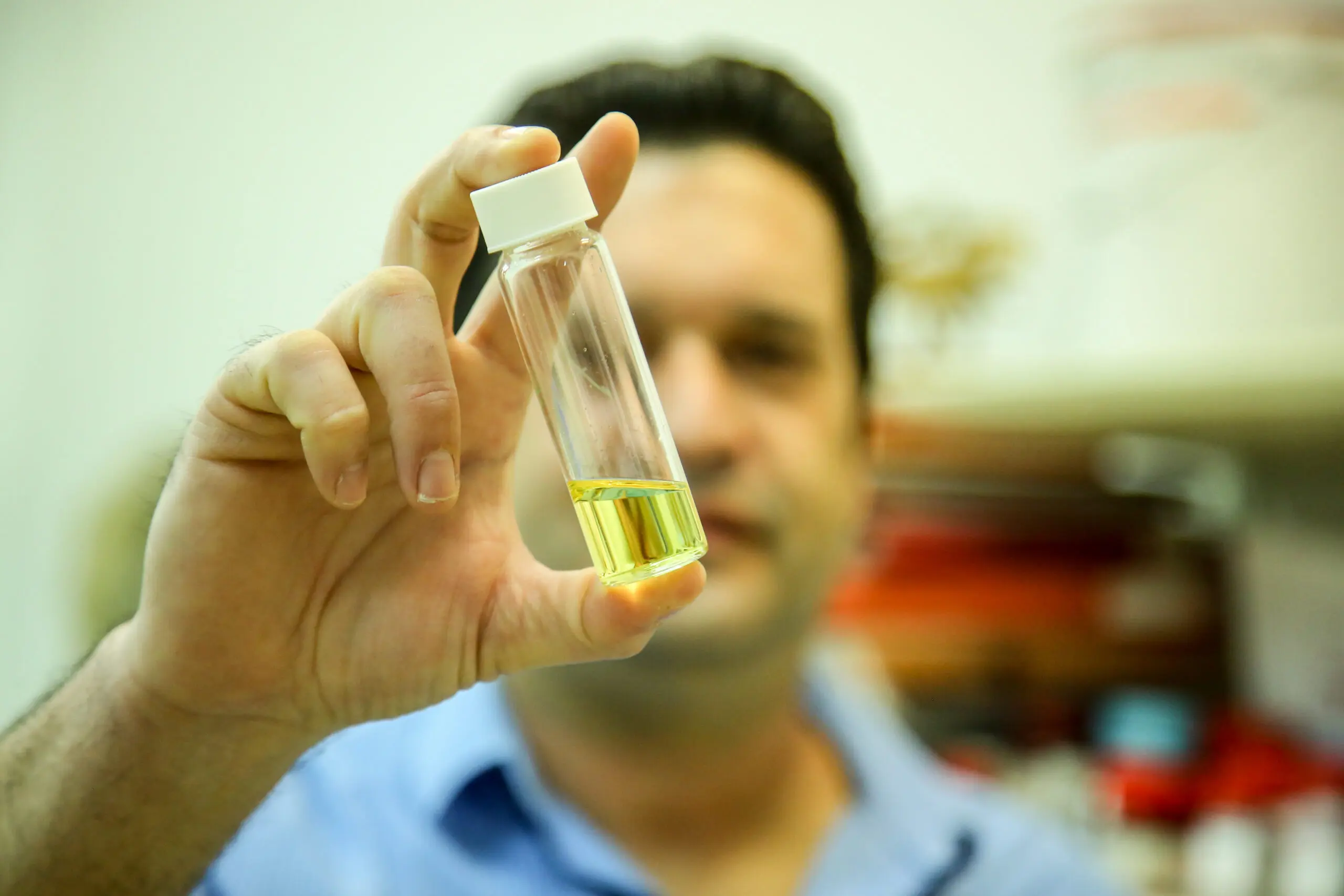
“Over 2 billion tons of petrochemicals are produced annually to manufacture polymers, plastics, and pharmaceuticals. We strive to decrease the dependency on these harmful materials and create greener energy. “
SNC: How did you end up in business?
Elad: I had no active influence that led me down the business path. During my studies in Business Administration, I developed a sense of how a business can be made and started to use the tools I was learning in chemistry to create my business and make an impact in the real world.
SNC: How did you get interested in petrochemicals?
Elad: During my Ph.D., I was researching alternatives to fuel and petrochemicals and realized how much of an impact these things can have on climate change. I wanted to replace our current toxic chemicals with safer and more environmentally friendly alternatives. I realized that, with the proper modifications, the ideas I discovered during my academic research could be implemented in various industries worldwide.
The process of converting a theoretical idea into a business plan took time. It’s one thing to have an idea for a cleaner energy technology, but making it into a financially sound business model is a different conversation. After completing my Ph.D., I worked for a big corporate firm that allowed me to see the business side more clearly and identify a significant gap in the green materials market that I can fill with my innovations.
SNC. What does your company do and why?
Elad: Celluflux focuses on developing bio-based materials that can fulfill the need to replace petrochemicals throughout various industries with environmentally friendly and sustainable materials. Over 2 billion tons of petrochemicals are produced annually to manufacture polymers, plastics, and many more products that we use on a daily basis. We strive to decrease the dependency on these harmful materials and create greener alternatives.
Petrochemicals account for higher levels of greenhouse gas emissions and play a huge role in water and soil pollution. Therefore it is apparent that petrochemicals must decarbonize to combat climate change in a meaningful way.
SNC: What was the first step you took to establish this company?
Elad: The first step was to find who in my circle of academic acquaintances would join me in this business venture. The first people I turned to were my two Ph.D. professors, Yoel Sasson and Zeev Aizenshtat from The Hebrew University. After discussing the idea with them, we saw the potential to make the idea into a company.
The second step was raising funds to get the project off the ground. Hard science businesses require a tremendous amount of funds for tests and experimentation, which meant we needed to find the right investor who believed in our mission. It took some time till we found the right investors who would facilitate our goal of bringing this idea to reality.
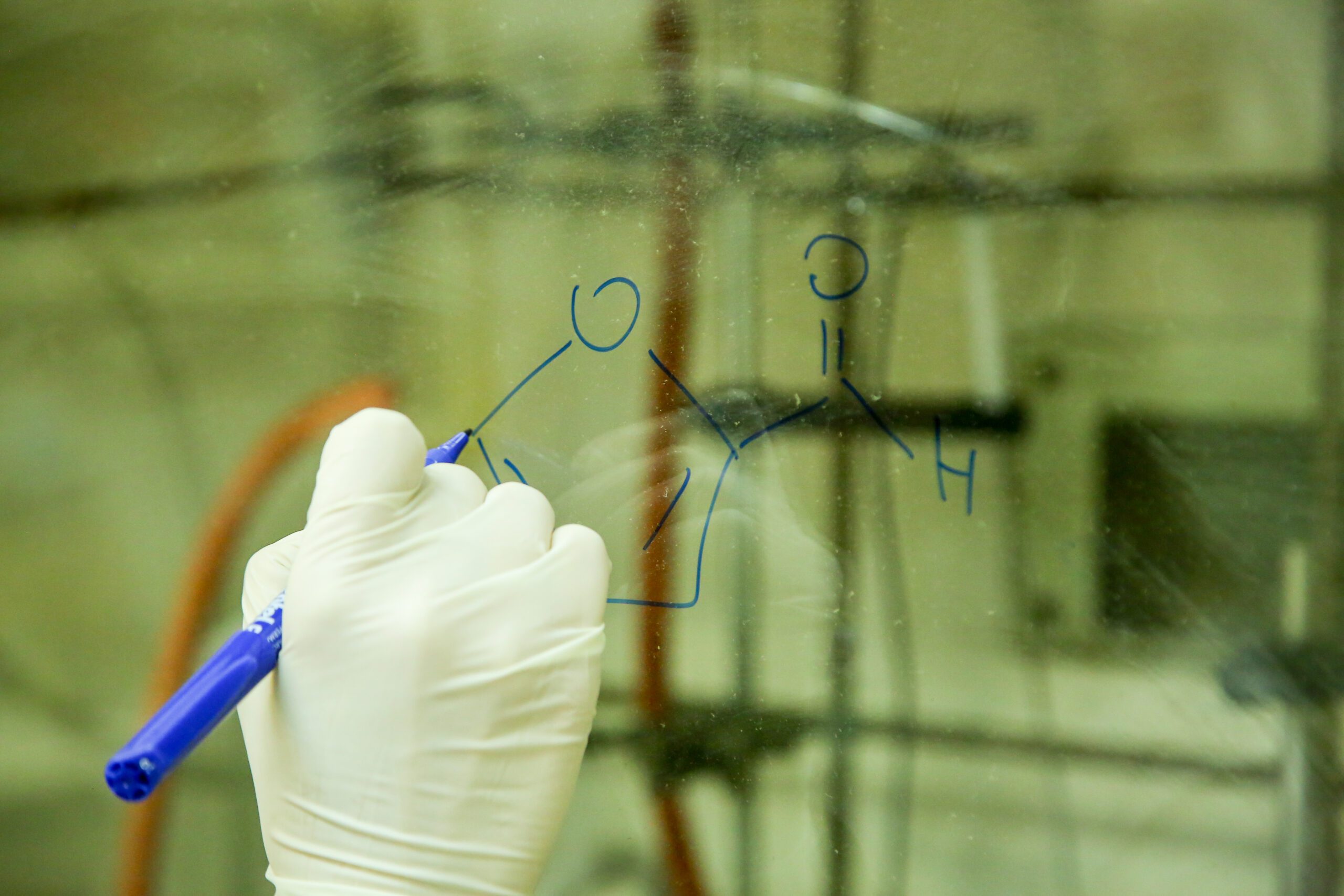
“Plants capture carbon dioxide through the natural process of photosynthesis, and we can extract the chemicals we need for the material from these plants. This results in lower carbon emissions and a higher positive environmental impact on the production of our product.”
SNC: How did you get past the hurdle of finding the right investor who believed in your concept?
Elad: We applied for a grant from the Israeli Innovation Authority. In addition, we garnered smaller investments from friends and family. With those funds, we established the company and developed the concept into a product.
SNC: Can you tell us more in detail about the product you’ve developed?
Elad: We started working with a chemical called hydroxymethylfurfural, or HMF, a compound suitable to replace petrochemicals in various fields. HMF is a very complex compound to work with, resulting in our team having to solve many technical challenges early in the development phase.
In the beginning, the plan was to make HMF-based fuel. But we discovered an efficient process to produce an analog to HMF that can be similarly used to replace petrochemicals and to answer the unmet need of multiple industries. After this discovery, we pivoted from the production of HMF to the HMF analog as we saw great potential in doing that.
Soon after this breakthrough, we were able to impress an experienced investor to invest in us and catapult our pre-seed investment round to new levels.
SNC: While researching your company, I came across the concept of renewable carbohydrates. Can you tell us more about it?
Elad: The HMF analog that we have developed can be produced from carbohydrates that are abundant in plants. These plants capture carbon dioxide that transforms into carbohydrates through the natural process of photosynthesis, and we can use these renewable carbohydrates in the production of essential chemicals. This results in lower carbon emissions and a higher positive environmental impact on the production of our product.
I believe carbohydrates will be the main source of carbon in the future in the same manner that petroleum is the source of carbon today.
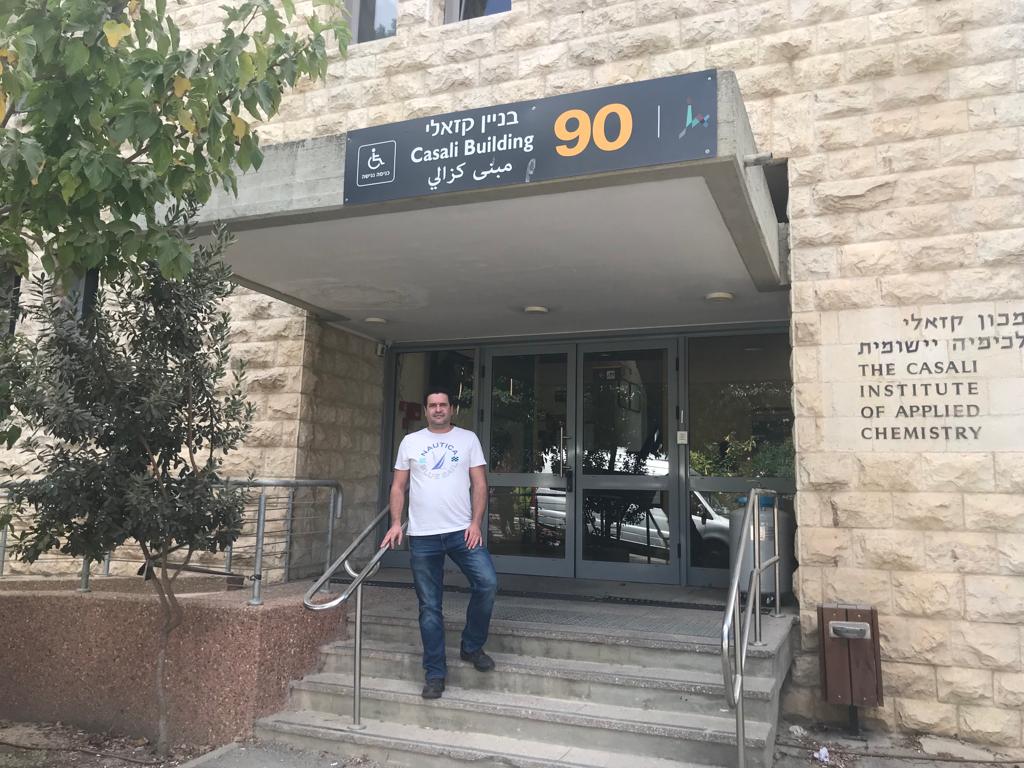
“Israelis can easily convert ideas to reality and innovate effortlessly to solve real-world problems.”
SNC: What does success look like to you?
Elad: Success, in my eyes, would be millions of tons of our product being used in various fields throughout the world and being able to make an impact on global warming and the environment. I can’t see myself saying, “I’ve made it,” because I always strive to look for the next challenge. There is always work to be done and problems to fix in the world.
SNC: What help would you need in the near future to get you to your destination?
Elad: The two primary things we’re looking for are funds and collaborative opportunities. We are looking to team up with businesses working in different fields to help us tinker with our product to be useful in various applications and address the needs within diverse industries. In addition, we are searching for talented scientists and engineers to help us design our processes to be as efficient as possible and develop new technologies in the future.
SNC: What do you think investors and corporate executives should know about Israel?
Elad: I believe Israel produces two essential traits that are hard to come by in people. The first trait is creativity, and Israelis have extraordinary abilities in innovating solutions to problems. The second trait is what we call “chutzpa” in Hebrew, which translates roughly to nerve or audacity. With these two attributes combined, Israelis can easily convert ideas to reality and innovate effortlessly to solve real-world problems.
“I’d like to highlight the opportunity that individual members of the public have to make a difference in climate change through technology.”
SNC: Do you have any advice for future entrepreneurs looking to make a name for themselves in a competitive resource-heavy industry?
Elad: Prepare yourself to encounter many obstacles. You must believe in your idea wholeheartedly to be able to persist through hard times and succeed.
SNC: What would you like your legacy to be?
Elad: I want to be remembered as an innovator, a successful entrepreneur, and a great CEO. I want to be remembered not only as a person who took action to change the world in a positive way but also – and maybe more importantly – as someone who did it very successfully.
SNC: Anything else you’d like to add that we haven’t touched upon?
Elad: I’d like to highlight the opportunity that individual members of the public have to make a difference in climate change through technology. It comes with difficulties, but once you have broken through the early hurdles, the impact you can make on a global level is unbelievable. We live in extraordinary times.
Check out Cellaflux on Start-Up Nation Finder.
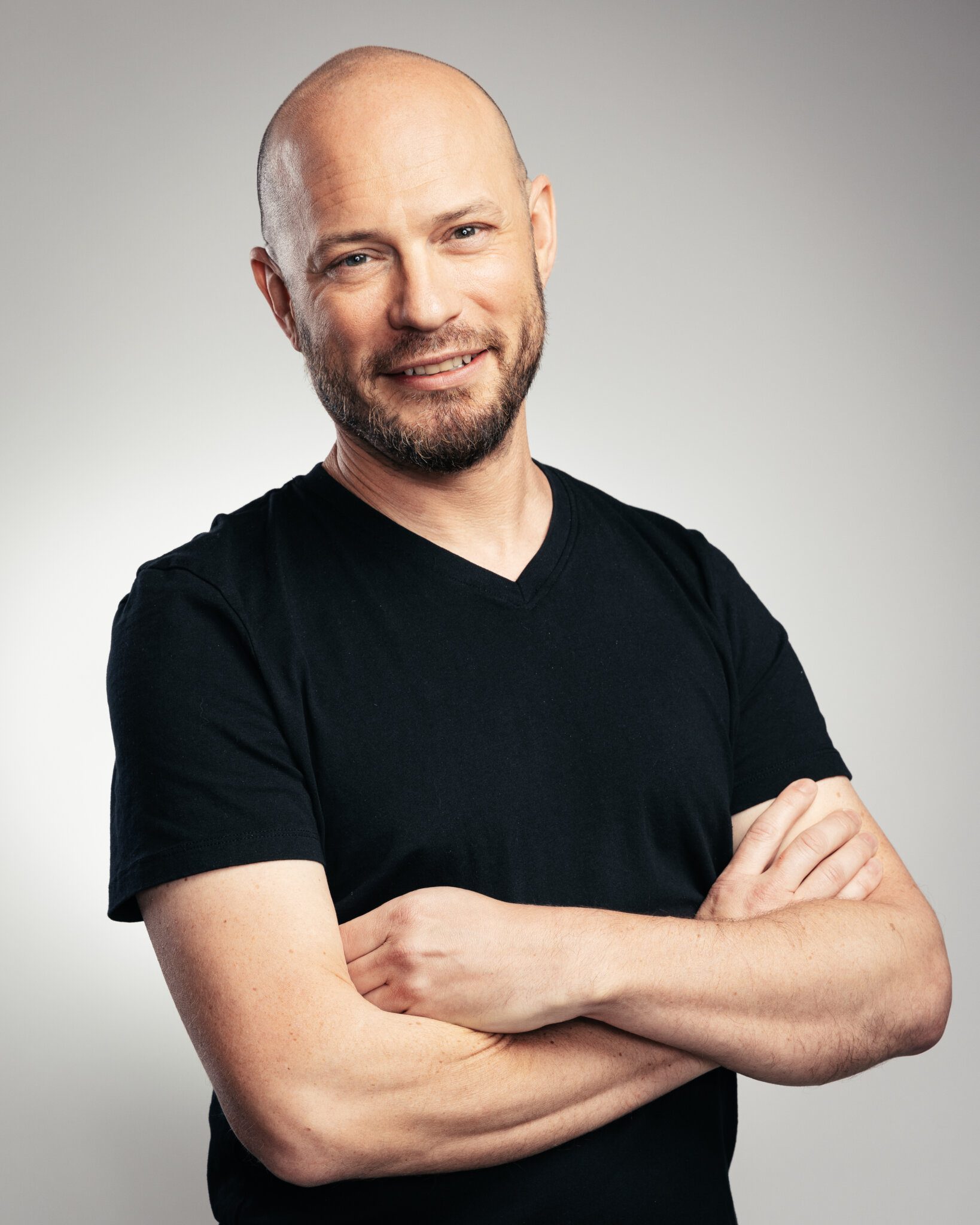
Phillip Stark is the Senior Creative Copywriter at Start-Up Nation Central, a non-profit organization that strengthens Israel’s innovation ecosystem and connects it to global challenges and stakeholders.